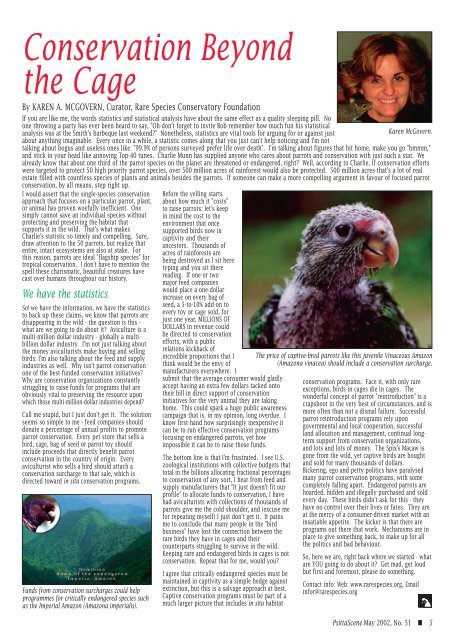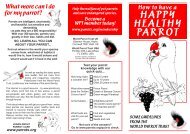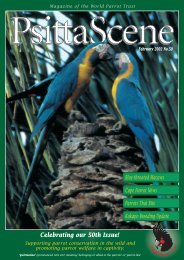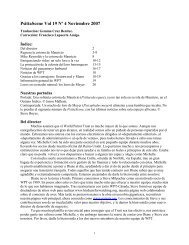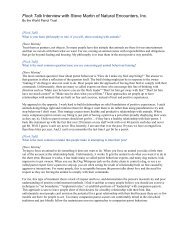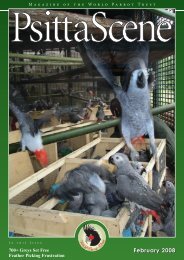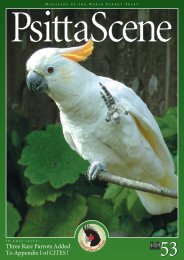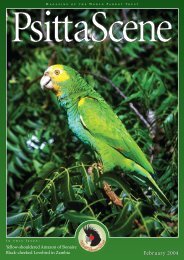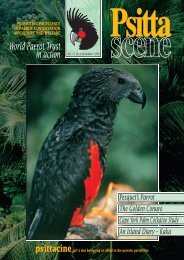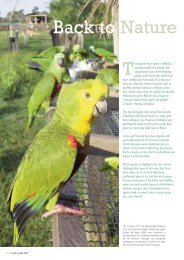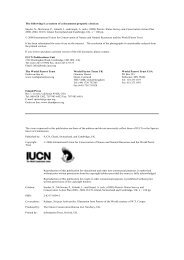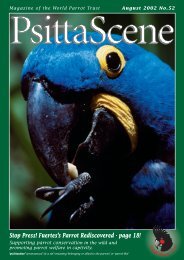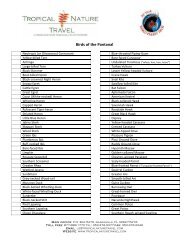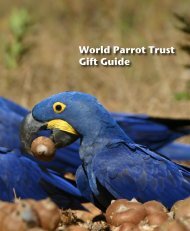Parrots in the Wild - World Parrot Trust
Parrots in the Wild - World Parrot Trust
Parrots in the Wild - World Parrot Trust
You also want an ePaper? Increase the reach of your titles
YUMPU automatically turns print PDFs into web optimized ePapers that Google loves.
Conservation Beyond<br />
<strong>the</strong> Cage<br />
By KAREN A. MCGOVERN, Curator, Rare Species Conservatory Foundation<br />
If you are like me, <strong>the</strong> words statistics and statistical analysis have about <strong>the</strong> same effect as a quality sleep<strong>in</strong>g pill. No<br />
one throw<strong>in</strong>g a party has ever been heard to say, "Oh-don't forget to <strong>in</strong>vite Bob-remember how much fun his statistical<br />
analysis was at <strong>the</strong> Smith's barbeque last weekend?" None<strong>the</strong>less, statistics are vital tools for argu<strong>in</strong>g for or aga<strong>in</strong>st just<br />
about anyth<strong>in</strong>g imag<strong>in</strong>able. Every once <strong>in</strong> a while, a statistic comes along that you just can't help notic<strong>in</strong>g-and I'm not<br />
talk<strong>in</strong>g about bogus and useless ones like: "99.9% of persons surveyed prefer life over death". I'm talk<strong>in</strong>g about figures that hit home, make you go "hmmm,"<br />
and stick <strong>in</strong> your head like annoy<strong>in</strong>g Top-40 tunes. Charlie Munn has supplied anyone who cares about parrots and conservation with just such a stat. We<br />
already know that about one third of <strong>the</strong> parrot species on <strong>the</strong> planet are threatened or endangered, right? Well, accord<strong>in</strong>g to Charlie, if conservation efforts<br />
were targeted to protect 50 high priority parrot species, over 500 million acres of ra<strong>in</strong>forest would also be protected. 500 million acres-that's a lot of real<br />
estate filled with countless species of plants and animals besides <strong>the</strong> parrots. If someone can make a more compell<strong>in</strong>g argument <strong>in</strong> favour of focused parrot<br />
Karen McGovern.<br />
conservation, by all means, step right up.<br />
I would assert that <strong>the</strong> s<strong>in</strong>gle-species conservation<br />
approach that focuses on a particular parrot, plant,<br />
or animal has proven woefully <strong>in</strong>efficient. One<br />
simply cannot save an <strong>in</strong>dividual species without<br />
protect<strong>in</strong>g and preserv<strong>in</strong>g <strong>the</strong> habitat that<br />
supports it <strong>in</strong> <strong>the</strong> wild. That's what makes<br />
Charlie's statistic so timely and compell<strong>in</strong>g. Sure,<br />
draw attention to <strong>the</strong> 50 parrots, but realize that<br />
entire, <strong>in</strong>tact ecosystems are also at stake. For<br />
this reason, parrots are ideal "flagship species" for<br />
tropical conservation. I don't have to mention <strong>the</strong><br />
spell <strong>the</strong>se charismatic, beautiful creatures have<br />
cast over humans throughout our history.<br />
We have <strong>the</strong> statistics<br />
So! we have <strong>the</strong> <strong>in</strong>formation, we have <strong>the</strong> statistics<br />
to back up <strong>the</strong>se claims, we know that parrots are<br />
disappear<strong>in</strong>g <strong>in</strong> <strong>the</strong> wild - <strong>the</strong> question is this -<br />
what are we go<strong>in</strong>g to do about it? Aviculture is a<br />
multi-million dollar <strong>in</strong>dustry - globally a multibillion<br />
dollar <strong>in</strong>dustry. I'm not just talk<strong>in</strong>g about<br />
<strong>the</strong> money aviculturists make buy<strong>in</strong>g and sell<strong>in</strong>g<br />
birds; I'm also talk<strong>in</strong>g about <strong>the</strong> feed and supply<br />
<strong>in</strong>dustries as well. Why isn't parrot conservation<br />
one of <strong>the</strong> best-funded conservation <strong>in</strong>itiatives?<br />
Why are conservation organizations constantly<br />
struggl<strong>in</strong>g to raise funds for programs that are<br />
obviously vital to preserv<strong>in</strong>g <strong>the</strong> resource upon<br />
which those multi-million-dollar <strong>in</strong>dustries depend?<br />
Call me stupid, but I just don't get it. The solution<br />
seems so simple to me - feed companies should<br />
donate a percentage of annual profits to promote<br />
parrot conservation. Every pet store that sells a<br />
bird, cage, bag of seed or parrot toy should<br />
<strong>in</strong>clude proceeds that directly benefit parrot<br />
conservation <strong>in</strong> <strong>the</strong> country of orig<strong>in</strong>. Every<br />
aviculturist who sells a bird should attach a<br />
conservation surcharge to that sale, which is<br />
directed toward <strong>in</strong> situ conservation programs.<br />
Funds from conservation surcharges could help<br />
programmes for critically endangered species such<br />
as <strong>the</strong> Imperial Amazon (Amazona imperialis).<br />
Before <strong>the</strong> yell<strong>in</strong>g starts<br />
about how much it "costs"<br />
to raise parrots; let's keep<br />
<strong>in</strong> m<strong>in</strong>d <strong>the</strong> cost to <strong>the</strong><br />
environment that once<br />
supported birds now <strong>in</strong><br />
captivity and <strong>the</strong>ir<br />
ancestors. Thousands of<br />
acres of ra<strong>in</strong>forests are<br />
be<strong>in</strong>g destroyed as I sit here<br />
typ<strong>in</strong>g and you sit <strong>the</strong>re<br />
read<strong>in</strong>g. If one or two<br />
major feed companies<br />
would place a one-dollar<br />
<strong>in</strong>crease on every bag of<br />
seed, a 5-to-10% add-on to<br />
every toy or cage sold, for<br />
just one year, MILLIONS OF<br />
DOLLARS <strong>in</strong> revenue could<br />
be directed to conservation<br />
efforts, with a public<br />
relations kickback of<br />
<strong>in</strong>credible proportions that I<br />
th<strong>in</strong>k would be <strong>the</strong> envy of<br />
manufacturers everywhere. I<br />
submit that <strong>the</strong> average consumer would gladly<br />
accept hav<strong>in</strong>g an extra few dollars tacked onto<br />
<strong>the</strong>ir bill <strong>in</strong> direct support of conservation<br />
<strong>in</strong>itiatives for <strong>the</strong> very animal <strong>the</strong>y are tak<strong>in</strong>g<br />
home. This could spark a huge public awareness<br />
campaign that is, <strong>in</strong> my op<strong>in</strong>ion, long overdue. I<br />
know first-hand how surpris<strong>in</strong>gly <strong>in</strong>expensive it<br />
can be to run effective conservation programs<br />
focus<strong>in</strong>g on endangered parrots, yet how<br />
impossible it can be to raise those funds.<br />
The bottom l<strong>in</strong>e is that I'm frustrated. I see U.S.<br />
zoological <strong>in</strong>stitutions with collective budgets that<br />
total <strong>in</strong> <strong>the</strong> billions allocat<strong>in</strong>g fractional percentages<br />
to conservation of any sort, I hear from feed and<br />
supply manufacturers that "It just doesn't fit our<br />
profile" to allocate funds to conservation, I have<br />
had aviculturists with collections of thousands of<br />
parrots give me <strong>the</strong> cold shoulder, and (excuse me<br />
for repeat<strong>in</strong>g myself) I just don't get it. It pa<strong>in</strong>s<br />
me to conclude that many people <strong>in</strong> <strong>the</strong> "bird<br />
bus<strong>in</strong>ess" have lost <strong>the</strong> connection between <strong>the</strong><br />
rare birds <strong>the</strong>y have <strong>in</strong> cages and <strong>the</strong>ir<br />
counterparts struggl<strong>in</strong>g to survive <strong>in</strong> <strong>the</strong> wild.<br />
Keep<strong>in</strong>g rare and endangered birds <strong>in</strong> cages is not<br />
conservation. Repeat that for me, would you?<br />
I agree that critically endangered species must be<br />
ma<strong>in</strong>ta<strong>in</strong>ed <strong>in</strong> captivity as a simple hedge aga<strong>in</strong>st<br />
ext<strong>in</strong>ction, but this is a salvage approach at best.<br />
Captive conservation programs must be part of a<br />
much larger picture that <strong>in</strong>cludes <strong>in</strong> situ habitat<br />
The price of captive-bred parrots like this juvenile V<strong>in</strong>aceous Amazon<br />
(Amazona v<strong>in</strong>acea) should <strong>in</strong>clude a conservation surcharge.<br />
conservation programs. Face it, with only rare<br />
exceptions, birds <strong>in</strong> cages die <strong>in</strong> cages. The<br />
wonderful concept of parrot "re<strong>in</strong>troduction" is a<br />
crapshoot <strong>in</strong> <strong>the</strong> very best of circumstances, and is<br />
more often than not a dismal failure. Successful<br />
parrot re<strong>in</strong>troduction programs rely upon<br />
governmental and local cooperation, successful<br />
land allocation and management, cont<strong>in</strong>ual longterm<br />
support from conservation organizations,<br />
and lots and lots of money. The Spix’s Macaw is<br />
gone from <strong>the</strong> wild, yet captive birds are bought<br />
and sold for many thousands of dollars.<br />
Bicker<strong>in</strong>g, ego and petty politics have paralysed<br />
many parrot conservation programs, with some<br />
completely fall<strong>in</strong>g apart. Endangered parrots are<br />
hoarded, hidden and illegally purchased and sold<br />
every day. These birds didn't ask for this - <strong>the</strong>y<br />
have no control over <strong>the</strong>ir lives or fates. They are<br />
at <strong>the</strong> mercy of a consumer-driven market with an<br />
<strong>in</strong>satiable appetite. The kicker is that <strong>the</strong>re are<br />
programs out <strong>the</strong>re that work. Mechanisms are <strong>in</strong><br />
place to give someth<strong>in</strong>g back, to make up for all<br />
<strong>the</strong> politics and bad behaviour.<br />
So, here we are, right back where we started - what<br />
are YOU go<strong>in</strong>g to do about it? Get mad, get loud<br />
but first and foremost, please do someth<strong>in</strong>g.<br />
Contact <strong>in</strong>fo: Web: www.rarespecies.org, Email<br />
<strong>in</strong>for@rarespecies.org<br />
PsittaScene May 2002, No. 51 ■ 5


